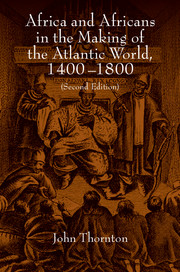Book contents
- Frontmatter
- Contents
- Preface to the second edition
- Abbreviations
- Maps
- Source notes for Maps 1–3
- Africa and Africans in the making of the Atlantic world, 1400–1800
- Introduction
- Part I Africans in Africa
- Part II Africans in the New World
- 5 Africans in colonial Atlantic societies
- 6 Africans and Afro-Americans in the Atlantic world: life and labor
- 7 African cultural groups in the Atlantic world
- 8 Transformations of African culture in the Atlantic world
- 9 African religions and Christianity in the Atlantic world
- 10 Resistance, runaways, and rebels
- 11 Africans in the eighteenth-century Atlantic world
- Index
6 - Africans and Afro-Americans in the Atlantic world: life and labor
Published online by Cambridge University Press: 05 June 2012
- Frontmatter
- Contents
- Preface to the second edition
- Abbreviations
- Maps
- Source notes for Maps 1–3
- Africa and Africans in the making of the Atlantic world, 1400–1800
- Introduction
- Part I Africans in Africa
- Part II Africans in the New World
- 5 Africans in colonial Atlantic societies
- 6 Africans and Afro-Americans in the Atlantic world: life and labor
- 7 African cultural groups in the Atlantic world
- 8 Transformations of African culture in the Atlantic world
- 9 African religions and Christianity in the Atlantic world
- 10 Resistance, runaways, and rebels
- 11 Africans in the eighteenth-century Atlantic world
- Index
Summary
A combination of political, demographic, and economic circumstances delivered African slaves to the heart of the new Atlantic world in the centuries after 1450. As workers, African slaves and their descendants (Afro-Americans) were a crucial part of the exploited labor force of every Atlantic colony. Their labor was vital for building the Atlantic world, and they made cultural contributions of great significance. This cultural impact was itself a product of the way in which they were integrated into the Atlantic world, for it gave them a geographic position of importance in those areas where culture change was most significant.
However, the nature of their cultural impact depended very much on the social conditions created by their role as exploited slaves in Atlantic economies. Slaves, however centrally located socially or geographically, may well make a very small cultural impact if their living conditions are bad enough and their position degraded enough. Those scholars who have argued that slaves made a minimum impact have often emphasized how their position as exploited and dependent laborers took them socially out of the mainstream of Atlantic culture, even if they were present geographically. An early position, for example, held by such scholars as Franklin Frazier and Stanley Elkins, maintained that the dynamics of the slave trade and the conditions of labor in the Atlantic world had the effect of traumatizing and marginalizing them, so that they became cultural receptacles rather than donors.
- Type
- Chapter
- Information
- Publisher: Cambridge University PressPrint publication year: 1998



